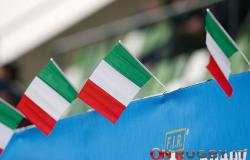Last March 23rd in Mezzano (Ravenna) during a football match he saw taking the field young footballers aged 11, the father of a kid on the home team he hit the Mezzano coach with a headbutt and also tried to kick him. What triggered the parent’s anger was the coach’s decision to replace his son, despite the fact that in the “Chicks” category the substitutions are “flying” and therefore the boy could have returned to the field during the match. Mattia Gallaminia young 22-year-old coach, went to the emergency room in Ravenna to be treated, suffering a fractured finger and non-blunt head trauma and then decided to file a complaint, given the seriousness of the episode. The matter ended with the issuing of a Daspo order (ban on access to sporting events) against the father. What is alarming is the fact that this episode is not isolated: reports of attacks on referees are multiplying, episodes of violence and racial insults in the world of amateur football, including youth football. To delve deeper into these issues we met Marco Capucci, responsible for the youth sector of Virtus Faenza for three years and with over twenty years of experience in local football clubs.
Interview with Marco Capucci, head of the Virtus Faenza youth sector
Capucci, how can competitive spirit and competition be reconciled with important values such as education and respect towards referees and opponents?
For us managers, respect towards our teammates, the referee, the opponents and education are fundamental. Our youth sector is among the few in the province to be recognized by the FIGC as an Elite Football School, therefore we follow precise protocols at a federal level, also with regards to sportsmanship and fair play. The coaches, especially the younger ones, follow courses with the aim of giving young footballers important input in terms of rules and behaviour. In fact, it is the coaches who are fundamental figures, because they are in close contact with the young players and their families, and therefore responsible for making people understand how important it is to maintain a certain profile. Furthermore, during this sports season there is a psychologist present, within a qualifying program provided by the FIGC, who follows training sessions and matches, interfacing with the coaches. He carried out around ten inspections during the year to evaluate behavior and attitudes in the field. For Virtus it is essential to be able to create a healthy environment, optimal for the growth and enjoyment of children.
Has your relationship with your parents changed over the years?
Compared to a few years ago, I have noticed an increasingly stronger negative interference from parents in the lives of their children and sometimes they even struggle to realize it. It happens more and more often that parents emotionally replace their children and it is from them that uncomfortable situations arise. Maybe for a child it is not so important to be replaced, start the match on the bench or play in one role rather than another but it is for parents who, more and more often, struggle to manage competitive spirit and competition. This risks triggering a conflict between the sports club and the family while there should be a synergy, to do the good of the kids together and teach them how to be within a group and how to compete together, at team level.
And how have young people changed?
The relationship with them has changed because the social context is different, with more and more technology and an increasingly massive use of social media. There is thus less space for direct communication and this also has repercussions within a changing room. But I must say that the kids manage the competition in a more balanced way than their parents and, except in isolated cases, they are willing to follow the directions of their coaches.
The data, at a national level, indicate a clear and alarming decline in young people who practice sports. A phenomenon that you also encounter?
Yes, unfortunately we are noticing that fewer and fewer young people decide to play football. In my opinion, the wrong message is being conveyed in the media that defeat is a failure, a sporting drama. Sport is no longer experienced with the right balance and young people want everything immediately, there is no longer the patience to train with commitment and consistency to obtain results. Thus it becomes tiring to manage the transition from the rookies, where everyone plays a portion of the game, to the very young players where presence on the pitch is no longer guaranteed and it is necessary to put in more effort to get on the pitch.
Italian talent crisis in football. “There is a lack of coaches who know how to help young people in the most delicate passages. And the amateur clubs are left to their own devices.”
There is more and more talk of Italian youth clubs in crisis and the national team has failed to qualify for the World Cup, twice in a row. Why are fewer and fewer Italian talents emerging?
In football there can be cycles but, in my opinion, talents in Italy have always been there and still are, while what is missing is the ability to know how to cultivate them. In the nurseries of important clubs there are talented kids who are unable to reach the highest levels because there is a lack of coaches who know how to manage the most delicate steps, who know how to accompany young people up to the first team.
There is a lack of figures who want to work on the player and not just on the team. The youth sectors should have as their first objective growing young footballers and training them for the first team while more and more often there is an exasperated focus on the result, with coaches who have career ambitions and do not know how to wait for young people. Thus, without the right figures it is increasingly difficult to emerge, even for the most talented. Furthermore, the Italian football system is characterized by the total absence of mutuality, the amateur clubs are left to their own devices, there is no solidarity from the top of the football system towards the base. Playing football at an amateur level has become a business. Reforms and investments are needed to change gear and allow amateur clubs to have good structures and adequately trained coaches, even at youth level.
Samuele Bondi
Tags: Violent parents stands Marco Capucci Virtus Faenza youth team Working create healthy environments







